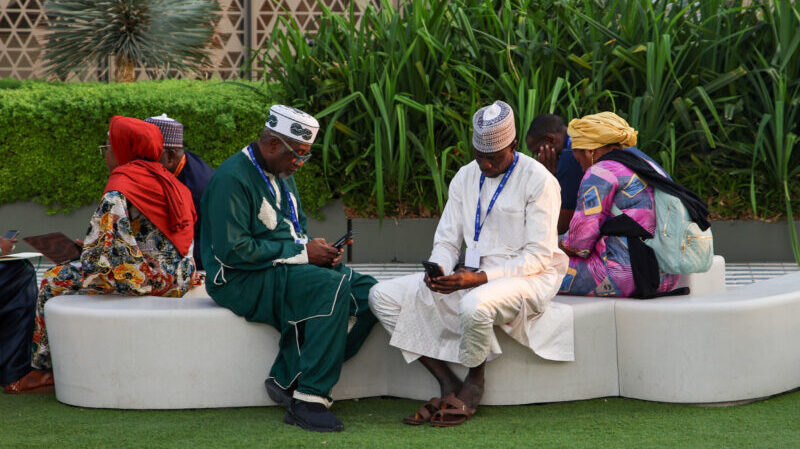Negotiators are locked in feverish marathon talks to hammer out the final technical draft of the global stocktake. The version published early Tuesday is a 24-page smörgåsbord of wildly ranging alternatives.
Take the energy package. On the defining battle of Cop28 – the fossil fuels conundrum – the draft text lays out two phase out options.
The first simply calls for “an orderly and just phase out of fossil fuels”, reflecting the position of the “high ambition coalition” (France, Kenya, Colombia and others).
The second is wordier. It has qualifiers that give cover to coal, oil and gas: countries should be “accelerating efforts” towards a phase out of “unabated” fossil fuels and “rapidly reducing their use” – but crucially not their production. It’s also more specific about the goal: “net-zero CO2 in energy systems by or around mid-century.”
On the technology side of the package, the text is setting up a repeat of the horse-trading already seen at the G20 this year. A paragraph calling for the tripling of renewable energy capacity by 2030 is followed by one pushing for the scale-up of the “low-emission technologies” preferred by fossil fuel industries, like carbon capture and storage and hydrogen. In Delhi last September the world’s largest economies landed on including both to make everyone happy.
Every paragraph also comes with a “no text” option. This could lead to some “take it or leave it” situations already seen last year in Sharm el-Sheik, observers said. Another iteration of the text is expected today.
Cinderella still waiting for fairy coach
Measures to adapt to climate change have often been called the Cinderella of climate change – ignored and underfed, sitting in rags by the stove while cutting emissions gets all the attention.
And it’s not going to the ball at this Cop either, especially as loss and damage has come strutting in, to hoover up donor governments’ attention and pledges.
The bad news started a few weeks ago when the OECD announced adaptation finance fell 14% between 2020 and 2021.
Then there’s been the Adaptation Fund pledges at Cop28. France and Germany’s are no greater than they were at Cop27 and the US, EU, UK and Japan have yet to chip in.
These don’t seem the actions of governments committed to meeting their Cop26 pledge to double adaptation finance on 2019 levels by 2025.
In global stocktake discussions, some countries want the standing committee on finance to draw up a “roadmap” on how developed countries will meet that target.
A source with knowledge of discussions said developed countries oppose it, as Cop26 only “urges” them to double so its not a commitment.
A group of self-proclaimed “adaptation champion” countries have been looking to multilateral development banks for the funds. They hosted a talk with the World Bank and Asian Development Bank yesterday.
Another source of cash could be carbon markets. But in March, carbon credit sellers like Conservation International and buyers like the BBVA bank fought off an attempt to place a mandatory levy on offsets to fund adaptation.
2021’s adaptation finance figures predate Cop26 and the doubling pledge. We could see better figures for 2022 and meet the goal by 2025.
Even then, it’s a drop in the water. Meeting the goal would be $40 billion a year. The United Nations says adaptation needs will be more like $140-300 billion a year by 2050.

Fossil lobbyist count is in
Figuring out who is and isn’t a fossil fuel lobbyist at Cop28 is painstaking work: over four days a team of researchers, coders and data analysts individually cross-checked 84,000 delegates with public sources for evidence of their fossil fuel interests.
Tears, tantrums, cold pizza slices, vats of coffees and 1.6 million data points were an integral part of the exercise, says Global Witness’ Patrick Galey.
The number he and others in the Kick Big Polluters Out coalition came up with was 2,456.
This is the highest number of coal, oil and gas representatives ever recorded at a UN climate conference. If they were a country, they would form the third largest delegation in Dubai.
In brief
Aussies away… – Australia has promised to stop bankrolling fossil fuel projects overseas with public money. It joins the US, Canada, the UK and many EU states in the Clean Energy Transition Partnership first launched at Cop26. Australia will now have a year to translate words into actions. Most signatories have done so with the notable exception of the US, Germany and Italy.
…and home – It is unclear if and when Canberra will apply similar measures for fossil fuel subsidies at home. Direct spending and tax breaks for producers and users cost Australians an estimated $11.1 billion last year.
Keeping it cool – 60 countries including the US, Canada and Kenya, have signed up to commitments to reduce the climate impact of the cooling sector. Signatories agreed to cut their cooling-related emissions by at least 68% from 2022 to 2050. India and China – two of the world’s largest users of cooling devices – have not joined the coalition.
Doorstepped – Total CEO Patrick Pouyanne was questioned by a campaigner against Total’s East Africa Crude Oil pipeline at Cop28 today. Zaki Mamdoo asked him if he would call on the Ugandan police to release seven student protesters. “That is what we are doing today,” he said.
BOGA grows – Kenya, Spain and Samoa have joined the Beyond Oil and Gas Alliance – a coalition of nations led by Denmark and Costa Rica which commit to stop producing oil and gas. None are significant oil and gas producers.
